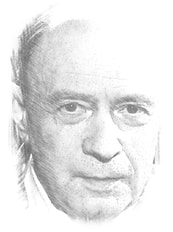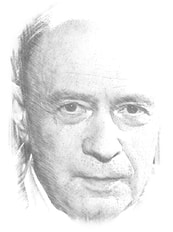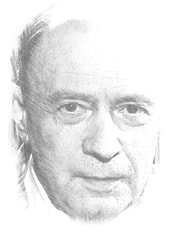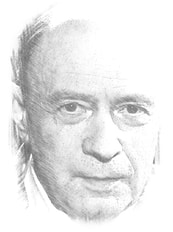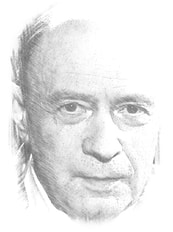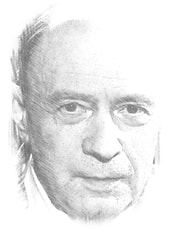Jacques Ellul |
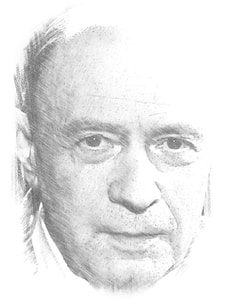 Jacques Ellul
Jacques Ellul
Jacques Ellul adhered to the maxim “think globally, act locally” throughout his life. He often said that he was born in Bordeaux by chance on January 6, 1912, but that it was by choice that he spent almost all his academic career there. With pastor Jean Bosc (1910-1969) he founded the Protestant Professional Association in order to help Protestants conciliate both their professional and Christian commitments.
It was Jean Boscwho enabled him to discover the works of Karl Barth. At his death in 1969, Jacques Ellul took over from him as main editor of Foi et Vie until 1986.
After a long illness, he died on May 19, 1994, in his house in Pessac just a mile or two from the University of Bordeaux campus, surrounded by those closest to him. Not long before his death, the limitations of the treatment for this illness confirmed to him once again one of his favorite themes: the ambivalence of technological progress.
 Jacques Ellul
Jacques Ellul
“To the extent that propaganda is based on current news, it cannot permit time for thought or reflection. A man caught up in the news must remain on the surface of the event; he is carried along in the current, and can at no time take a respite to judge and appreciate; he can never stop to reflect. There is never any awareness -- of himself, of his condition, of his society -- for the man who lives by current events. Such a man never stops to investigate any one point, any more than he will tie together a series of news events. We already have mentioned man's inability to consider several facts or events simultaneously and to make a synthesis of them in order to face or to oppose them. One thought drives away another; old facts are chased by new ones. Under these conditions there can be no thought. And, in fact, modern man does not think about current problems; he feels them. He reacts, but be does not understand them any more than he takes responsibility for them. He is even less capable of spotting any inconsistency between successive facts; man's capacity to forget is unlimited. This is one of the most important and useful points for the propagandist, who can always be sure that a particular propaganda theme, statement, or event will be forgotten within a few weeks. Moreover, there is a spontaneous defensive reaction in the individual against an excess of information and -- to the extent that he clings (unconsciously) to the unity of his own person -- against inconsistencies. The best defense here is to forget the preceding event. In so doing, man denies his own continuity; to the same extent that he lives on the surface of events and makes today's events his life by obliterating yesterday's news, he refuses to see the contradictions in his own life and condemns himself to a life of successive moments, discontinuous and fragmented.
This situation makes the "current-events man" a ready target for propaganda. Indeed, such a man is highly sensitive to the influence of present-day currents; lacking landmarks, he follows all currents. He is unstable because he runs after what happened today; he relates to the event, and therefore cannot resist any impulse coming from that event. Because he is immersed in current affairs, this man has a psychological weakness that puts him at the mercy of the propagandist. No confrontation ever occurs between the event and the truth; no relationship ever exists between the event and the person. Real information never concerns such a person. What could be more striking, more distressing, more decisive than the splitting of the atom, apart from the bomb itself? And yet this great development is kept in the background, behind the fleeting and spectacular result of some catastrophe or sports event because that is the superficial news the average man wants. Propaganda addresses itself to that man; like him, it can relate only to the most superficial aspect of a spectacular event, which alone can interest man and lead him to make a certain decision or adopt a certain attitude.
But here we must make an important qualification. The news event may be a real fact, existing objectively, or it may be only an item of information, the dissemination of a supposed fact. What makes it news is its dissemination, not its objective reality.”
― Jacques Ellul, Propaganda: The Formation of Men's Attitudes
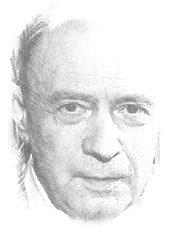 Jacques Ellul
Jacques Ellul
“Those who read the press of their group and listen to the radio of their group are constantly reinforced in their allegiance. They learn more and more that their group is right, that its actions are justified; thus their beliefs are strengthened. At the same time, such propaganda contains elements of criticism and refutation of other groups, which will never be read or heard by a member of another group...Thus we see before our eyes how a world of closed minds establishes itself, a world in which everybody talks to himself, everybody constantly views his own certainty about himself and the wrongs done him by the Others - a world in which nobody listens to anybody else.”
― Jacques Ellul, Propaganda: The Formation of Men's Attitudes
― Jacques Ellul, Propaganda: The Formation of Men's Attitudes
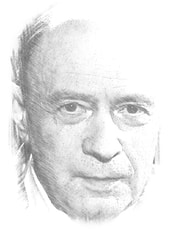 Jacques Ellul
Jacques Ellul
“We must be convinced that there are no such things as 'Christian principles.' There is the Person of Christ, who is the principle of everything. But if we wish to be faithful to Him, we cannot dream of reducing Christianity to it certain number of principles (though this is often done), the consequences of which can be logically deduced. This tendency to transform the work of the Living God into a philosophical doctrine is the constant temptation of theologians, and also of the faithful, and their greatest disloyalty when they transform the action of the Spirit which brings forth fruit in themselves into an ethic, a new law, into 'principles' which only have to be 'applied.”
― Jacques Ellul, The Presence of the Kingdom
― Jacques Ellul, The Presence of the Kingdom
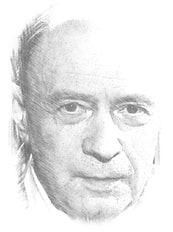 Jacques Ellul
Jacques Ellul
“Christians were never meant to be normal. We’ve always been holy troublemakers, we’ve always been creators of uncertainty, agents of dimension that’s incompatible with the status quo; we do not accept the world as it is, but we insist on the world becoming the way that God wants it to be. And the Kingdom of God is different from the patterns of this world.”
― Jacques Ellul
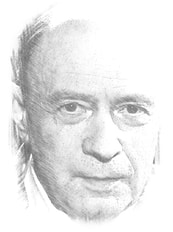 Jacques Ellul
Jacques Ellul
“To be effective, propaganda must constantly short-circuit all thought and decision. It must operate on the individual at the level of the unconscious. He must not know that he is being shaped by outside forces...but some central core in him must be reached in order to release the mechanism in the unconscious which will provide the appropriate - and expected - action.”
― Jacques Ellul, Propaganda: The Formation of Men's Attitudes
 Jacques Ellul
Jacques Ellul
“People used to think that learning to read evidenced human progress; they still celebrate the decline of illiteracy as a great victory; they condemn countries with a large proportion of illiterates; they think that reading is a road to freedom. All this is debatable, for the important thing is not to be able to read, but to understand what one reads, to reflect on and judge what one reads. Outside of that, reading has no meaning (and even destroys certain automatic qualities of memory and observation). But to talk about critical faculties and discernment is to talk about something far above primary education and to consider a very small minority. The vast majority of people, perhaps 90 percent, know how to read, but do not exercise their intelligence beyond this. They attribute authority and eminent value to the printed word, or, conversely, reject it altogether. As these people do not possess enough knowledge to reflect and discern, they believe—or disbelieve—in toto what they read. And as such people, moreover, will select the easiest, not the hardest, reading matter, they are precisely on the level at which the printed word can seize and convince them without opposition. They are perfectly adapted to propaganda.”
― Jacques Ellul, Propaganda: The Formation of Men's Attitudes
― Jacques Ellul, Propaganda: The Formation of Men's Attitudes
 Jacques Ellul
Jacques Ellul
The Christian who is involved in the material history of this world is involved in it as representing another order, another master (than the prince of this world), another claim (than that of the natural heart of man). Thus he must plunge into social and political problems in order to have an influence in the world, not in the hope of making it a paradise, but simply in order to make it tolerable--not in order to diminish the opposition between this world and the Kingdom of God, but simply in order to modify the opposition of this world and the order of preservation that God wills for it--not in order to "bring in" the Kingdom of God, but in order that the gospel may be proclaimed, that all men may really hear the good news of salvation through the death and resurrection of Christ. --Jacques Ellul
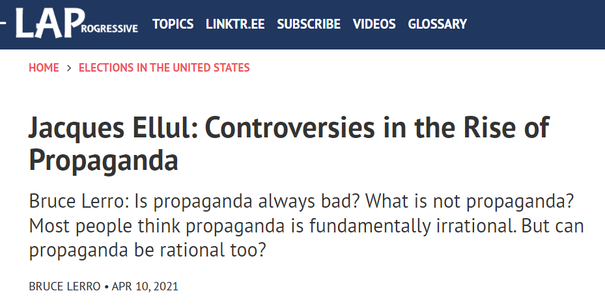
April 10, 2021: LA Progressive: Jacques Ellul: Controversies in the Rise of Propaganda
MOST PROVOCATIVE POINTS OF ELLUL’S PROPAGANDA THEORY
MOST PROVOCATIVE POINTS OF ELLUL’S PROPAGANDA THEORY
- Unlike other theorists, Ellul argued that propaganda served both the upper classes and the lower classes for different reasons.
- Unlike other theorists, he understood propaganda as inevitable in modern societies. There is no getting around it.
- Unlike most other theorists, he saw masses of people as complicit in their own subordination. He saw them neither as victims of circumstance nor heroic masses.
- He distinguished between hard, fast, political propaganda and soft, slow sociological He called political propaganda “agitation”. Education is not outside propaganda. It is sociological propaganda.
- He identified two techniques of propagandizing the masses. First kind is mithridatization which acts like a sedative and sensibilization which is about riling people up.
- Unlike most other theorists of propaganda, Ellul followed Joseph Goebbels and said that the best propaganda is based on facts. It becomes propaganda with the interpretation of facts. Propaganda based on lies is a sign of weakness.
- Most propaganda theorists thought the working class was more most impacted by propaganda. Ellul argued that it is the upper-middle classes that create the propaganda and that is most likely to believe it.
- Ellul distinguished horizontal propaganda, which was made inside the group, from vertical propaganda, which uses centralized power. An example of horizontal propaganda was the educational groups of Yankee soldiers organized by the Chinese communists.
- For Ellul, propaganda does not come from the ruling class, but from the upper-middle class.
- Industrialist capitalist “democracies” need propaganda because they depend on public opinion, which is disorganized. It requires propaganda to compete with socialist societies.
- Unlike other theorists, Ellul makes a distinction between ideology and myth and argues that myth is more powerful.
- His concept of crystallization claims that the individual has latent drives and stereotypes which are vague (based on the work of Karen Horney), and they then become the foundation of propaganda.
- Unlike other schools of propaganda, Ellul argues that quantitative study of propaganda isn’t effective. One cannot tell how many people are reached and how effective white vs black propaganda is. At what point do you say it failed? At what point does the payoff justify the cost?
- According to Ellul, psychological propaganda in foreign countries does not work. Propagandists are too ignorant of the attitudes, centers of interest, presuppositions and suspicions of the foreign population.............
- .....Mass communications theorists see propaganda as a benign alternative to force and for this reason, they believe it is moral. They think the polls are designed so political leaders can better control their population in order for the population not to resort to violence. The critical thinking movement interestingly points to the collusion of masses of people in propaganda. If the average person had good critical thinking skills, no one would pay attention to propaganda. Surprisingly, Ellul as a sociologist does not see propaganda as a product of class forces. He thinks, as I said above, propaganda is inevitable in any mass society just because people need to know what is going on politically and economically, and they can no longer find out through face-to-face contact. For him, propaganda might not be very moral, but it is necessary............The purpose of propaganda also has a wide variation of stances. The purpose for both the extreme left and extreme right is to unmask either the communist or capitalist threat. For the commercial practitioners the purpose of propaganda is to sell products. For the Mass Communication theorists, propaganda is to act as a safety valve to let the leaders know what the public wants or doesn’t want. For critical thinking theorists, their purpose is to expose the informal logical fallacies that typically go with interpreting propaganda. This might include ad hominem arguments, “either or thinking”, bandwagon and conflict of interests within the authorities. For the muckrakers, exposure is the name of the game whether it be the corporations or the state. Ellul has something interesting to say about this. He says the purpose of propaganda is a) to support existing elites in their competition with other elites and b) it is used by the masses that need propaganda to help them understand the complexities of large-scale social life....................Both the right-wing reactionaries and the left-wing socialists naively think that propaganda is about lies and that truth has no element of propaganda in it. For commercial practitioners’ propaganda is white propaganda – white lies, tall stories, euphemisms and cliches. Mass communications theorists say propaganda is lies about facts. They agree that propaganda could never be based on the truth. Muckrakers also tend to believe propaganda is usually about incorrect facts. Critical thinking theorists think that propaganda can be about lies or about the truth. Ellul’s understanding was the most sophisticated. He followed what Goebbels said about propaganda. The best propaganda is based on facts. Where the propaganda enters is in how the facts are interpreted. Like stereotypes, no propaganda could stick in people’s minds if there wasn’t more than a grain of truth to them......................So, is propaganda rational or irrational? Right-wing reactionaries think that communist propaganda is super-rational and fail to take into consideration the emotional side of humanity. Left-wing socialists think that the appeal of reactionary conservatives, whether religious fundamentalists or fascists, is emotional and irrational. Appeals to God and country, blood and soil have no rational basis. Commercial practitioners and mass communication theorists both agree that propaganda is irrational. Commercial practitioners argue their techniques are to appeal to infantile fantasies, as we will see. Mass communication theorists think that anything outside their realm of science is potentially irrational. They think that privately people are more likely to be rational than as a mass. Both critical thinking theorists and muckrakers understand that propaganda can be both rational and irrational. Ellul agrees, adding that propaganda is mostly rational and that irrational propaganda (citing his book written in 1960) is a thing of the past..........................Critical thinking advocates are critical of messages and the political leanings of the sources. They are sensitive to which medium the message comes through because fast mass media will not allow people to digest the information and take it apart critically. It is the muckrakers who are the most critical of all three. As journalists, they are very aware that movies have enormous propaganda potential for storytelling. Television and radio communicate more quickly and there is little time to think. Books, newspapers and magazines have less propaganda potential because the audience can regulate the information at their own pace. The sociological school of Ellul is more critical of the message and the medium but pays less attention to the source....................Reactionary fascists like Goebbels also understood this and simply reinforced what the German masses seemed to believe. Ellul agrees that propaganda is not about changing attitudes but rather about strengthening what is already there. Mass communications theorists were not really interested in getting people to act, but they hoped that by studying attitudes of masses in polling, leaders could better match the wants of the masses so that they did not lead to destructive collective behavior. The radical left has been historically the most naïve about this, thinking that working class people’s attitudes could be changed towards socialism.....................Ellul also relied on conditioned reflexes but then added two other processes:
- Mithridatization which acted like a sedative
- Sensibilization which acted like a stimulant
- To paraphrase, Ellul (183) mithridatization (the sedative part) is a toxin antitoxin process whereby a person is rendered immune to a poison by tolerating gradually increased doses of it. Closing up, he becomes insensitive to propaganda as a result of past shocks. He no longer looks at posters. He no longer reads the newspaper, but skims distractedly over it. Yet he continues to obey the catchwords of propaganda......................Goebbels writes that propaganda should reduce frustrations and artificially resolve real problems and anticipate the frustrations to come when they cannot avoid them. Propaganda is like a cure that would numb the liver of an alcoholic in such a way that he could continue to get drunk without feeling pain in his liver, even though it would still kill him. Propaganda suppresses the warning signals that his anxieties, maladjustments, rebellions and demands once supplied. Now he is no more himself than he is when he reacts biologically to a tranquilizer. Propaganda will appear to be a true remedy, but for a sickness deliberately provoked to fit the remedy. Propaganda will intervene as the fake instrument for reducing these tensions by external action. They will flee contradictions by escape through the contemporary ideology of happiness.................If mithridatization is cooling people out, sensibilization is riling people up. Sensibilization is the increase of sensitivity or susceptibility to stimulation. Ellul says the individualist is more sensitive, not to the content but to the impetus it gives him for the excitement it makes him feel. He needs refreshment, a booster shot. When he goes to political movies it gives an outlet. Propaganda offers release on a grand scale. Just like in Orwell’s 1984 two-minute hate rants, it will permit hatred and provides an object of hatred. It points out enemies to be slain – Jews, bourgeoisie, or communists. Authoritarian governments allow satirical journals attacking the authorities or a wild holiday paid for by the dictator (The Friday of Sorrows in Guatemala). The bureaucrat becomes the scapegoat, while the party remains above reproach. Letters to the editor by the public serve a similar function in Yankeedom. The sensibilization process has a freshness and novelty which correspond to new situations and gives the individualist the impression of having invented new ideals. It provides humanity with a high ideal and permits him to give into his passions while seeming to accomplish a great mission..................For its time, the most sophisticated dynamical version of the relationship between the speed at which propaganda works is Ellul’s distinction between sociological propaganda and political propaganda. Political propaganda works quickly, attempting to spread a doctrine, dividing and excluding people, as in wars and revolutions. The language is emotional loaded with virtue and vice words. Political propaganda works best in public settings where people are at the same place and the same time. People are swept out of everyday life into a kind of adventure. Political propaganda may be overt at the culmination of a campaign, but much of political propaganda is covert beforehand.....................At the other extreme, sociological propaganda attempts to unify rather than divide people. It works slowly and methodically. No crisis is at hand and society is moving along at a normal pace. Whereas political propaganda spreads a political doctrine, sociological propaganda spreads a way of life. While political propaganda works best in public, sociological propaganda does not require being in the same place and the same time. Masses take in sociological propaganda over months and even years. Sociological propaganda such as advertising, movies, sports and education is overt in part because it is not perceived as propaganda. The language of sociological propaganda is not inflammatory. It acts as a sedative, using euphemisms, clichés or vague terminology. The purpose is to support the existing system rather than overturn it................Ellul argues that all the dominant institutions are there to perpetuate their own existence and this applies to both capitalist and socialist societies. Surprisingly, Ellul says that it is not the ruling class that is responsible for mass propaganda. They are too remote to understand how to influence the lower classes. Instead, it turns the job over to the upper-middle class. But as Ellul points out, the upper-middle class does not to a good job with it. The lower classes do not read newspapers, or magazines. The lower classes are more susceptible to TV, especially to shows depicting upper-middle class life. The lower classes have their own music and sports which the upper-middle class does not understand or belittles.............Ellul is rather hopeless about the masses, seeing them as disorganized and passive.
Mass communications theorists are more hopeful about the masses. They are passive but can become active once the facts are given to them by the polls. For critical theorists, there is a big difference between publics and masses. Publics have more potential because they meet in face-to-face gatherings. Masses cannot see each other face-to-face and can be active only if they have overcome the reasoning fallacies. Muckrakers think of the masses as temporarily foolish but as potentially active, capable of cooperation, but simply lack information about how dominant organizations obstruct their judgment. The job of muckrakers is to expose dominant institutions. The radical left understands the public most dialectically. They see the masses as victims of capitalist institutions. But they can become active and revolutionary when not oppressed by capitalist forces............................The critical thinking movement argues that by utilizing more critical thinking tools masses can resist propaganda. Muckrakers also see people banding together and forming alternative media sources. Ellul sees the relationship between propagandists and masses as mutually constitutive. Masses need propagandists in order to understand more simply the complexity of the world. Propagandists need the masses to fight wars and produce profit...................Earlier I said that reactionary conservatives had a rather cynical attitude towards the lower classes, dismissing them as dupes. However, they also think that it is the middle-class and upper-middle class intellectuals who promote communism, get carried away with the ideology they create and spin unrealistic prospects for a utopian future. Ellul agrees. He also says the social class most susceptible to propaganda is the upper-middle, class for they are the ones who are creating the symbol systems and they are the most enthralled with them. He believes that they are more interested in the social issues that the propagandists target and because they are convinced of their own superiority in understanding them. They are more vulnerable to propaganda because they think they are beyond it............ Conservatives don’t think that religion in itself is a form of propaganda. Ellul agrees, saying masses of people are more vulnerable to propaganda than the face-to-face public relations of people living in collectivist societies..............Both Ellul and reactionary conservatives think that democracy doesn’t work, but for different reasons. Ellul simply thinks democracy is impossible in a modern society and the word itself is used for propagandistic purposes to give people the illusion of choice. For the reactionary conservatives, democracy is looked upon as an unfavorable turn of events at the end of the 19th century. For political conservatives there is a natural hierarchy, placing people with superior talent and good breeding at the top and their inferiors at the bottom. Democracy is understood as the rule of a mob that should never rule. Ortega Y Gasset would be the appropriate theoretician for this view.
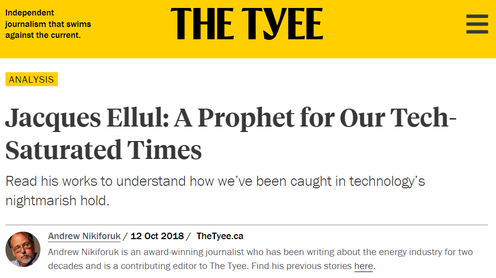
Facebook and other social media have undermined what’s left of the illusion of democracy, while smartphones damage young brains and erode the nature of discourse in the family.
Meanwhile computers and other gadgets have diminished our attention spans along with our ever-failing connection to reality.
The Foundation for Responsible Robotics recently created a small stir by asking if “sexual intimacy with robots could lead to greater social isolation.”
What could possibly go wrong?
The average teenager now works about two hours of every day — for free — providing Facebook and other social media companies with all the data they need to engineer young people’s behaviour for bigger Internet profits.
Without shame, technical wonks now talk of building artificial scientists to resolve climate change, poverty and, yes, even fake news.
The media backlash against Silicon Valley and its peevish moguls, however, typically ends with nothing more radical than an earnest call for regulation or a break-up of Internet monopolies such as Facebook and Google.
The problem, however, is much graver, and it is telling that most of the backlash stories invariably omit any mention of technology’s greatest critic, Jacques Ellul.
The ascent of technology
Jacques Ellul, the Karl Marx of the 20th century, predicted the chaotic tyranny many of us now pretend is the good and determined life in technological society. He wrote of technique, about which he meant more than just technology, machines and digital gadgets but rather “the totality of methods rationally arrived at and having absolute efficiency” in the economic, social and political affairs of civilization. For Ellul, technique, an ensemble of machine-based means, included administrative systems, medical tools, propaganda (just another communication technique) and genetic engineering. The list is endless because technique, or what most of us would just call technology, has become the artificial blood of modern civilization.
“Technique has taken substance,” wrote Ellul, and “it has become a reality in itself. It is no longer merely a means and an intermediary. It is an object in itself, an independent reality with which we must reckon.” Just as Marx deftly outlined how capitalism threw up new social classes, political institutions and economic powers in the 19th century, Ellul charted the ascent of technology and its impact on politics, society and economics in the 20th. My copy of Ellul’s The Technological Society has yellowed with age, but it remains one of the most important books I own. Why?
Because it explains the nightmarish hold technology has on every aspect of life, and also remains a guide to the perplexing determinism that technology imposes on life. Until the 18th century, technical progress occurred slowly and with restraint. But with the Industrial Revolution it morphed into something overwhelming due in part to population, cheap energy sources and capitalism itself.
Since then it has engulfed Western civilization and become the globe’s greatest colonizing force.
“Technique encompasses the totality of present-day society,” wrote Ellul. “Man is caught like a fly in a bottle. His attempts at culture, freedom, and creative endeavour have become mere entries in technique’s filing cabinet.”
Ellul, a brilliant historian, wrote like a physician caught in the middle of a plague or physicist exposed to radioactivity. He parsed the dynamics of technology with a cold lucidity. Yet you’ve probably never heard of the French legal scholar and sociologist despite all the recent media about the corrosive influence of Silicon Valley.
His relative obscurity has many roots. He didn’t hail from Paris, but rural Bordeaux. He didn’t come from French blue blood; he was a “meteque.”
He didn’t travel much, criticized politics of every stripe and was a radical Christian.
But in 1954, just a year before American scientists started working on artificial intelligence, Ellul wrote his monumental book, The Technological Society.
The dense and discursive work lays out in 500 pages how technique became for civilization what British colonialism was for parts of 19th-century Africa: a force of total domination.
In the book Ellul explains in bold and uncompromising terms how the logic of technological innovation conquered every aspect of human culture.
Ellul didn’t regard technology as inherently evil; he just recognized that it was a self-augmenting force that engineered the world on its terms. Machines, whether mechanical or digital, aren’t interested in truth, beauty or justice. Their goal is to make the world a more efficient place for more machines.
Their proliferation combined with our growing dependence on their services inevitably led to an erosion of human freedom and unintended consequences in every sphere of life.
Ellul was one of the first to note that you couldn’t distinguish between bad and good effects of technology. There were just effects and all technologies were disruptive.
In other words, it doesn’t matter if a drone is delivering a bomb or book or merely spying on the neighbourhood, because technique operates outside of human morality: “Technique tolerates no judgment from without and accepts no limitations.”
Facebook’s mantra “move fast and break things” epitomizes the technological mindset. But some former Facebook executives such as Chamath Palihapitiya belatedly realized they have engineered a force beyond their control. (“The short-term dopamine-driven feedback loops that we have created are destroying how society works,” Palihapitiya has said.) That, argued Ellul, is what technology does. It disrupts and then disrupts again with unforeseen consequences, requiring more techniques to solve the problems created by latest innovations.
As Ellul noted back in 1954, “History shows that every technical application from its beginnings presents certain unforeseeable secondary effects which are more disastrous than the lack of the technique would have been.”
Ellul also defined the key characteristics of technology.
For starters, the world of technique imposes a rational and mechanical order on all things. It embraces artificiality and seeks to replace all natural systems with engineered ones.
In a technological society a dam performs better than a running river, a car takes the place of the pedestrians — and may even kill them — and a fish farm offers more “efficiencies” than a natural wild salmon migration.
There is more. Technique automatically reduces actions to the “one best way.” Technical progress is also self-augmenting: it is irreversible and builds with a geometric progression.
(Just count the number of gadgets telling you what to do or where to go or even what music to play.)
Technology is indivisible and universal because everywhere it goes it shows the same deterministic face with the same consequences. And it is autonomous.
By autonomous, Ellul meant that technology had become a determining force that “elicits and conditions social, political and economic change.”
The role of propaganda
The French critic was the first to note that technologies build upon each other and therefore centralize power and control. New techniques for teaching, selling things or organizing political parties also required propaganda.
Here again Ellul saw the future.
He argued that propaganda had to become as natural as breathing air in a technological society, because it was essential that people adapt to the disruptions of a technological society.
“The passions it provokes — which exist in everybody — are amplified. The suppression of the critical faculty — man’s growing incapacity to distinguish truth from falsehood, the individual from the collectivity, action from talk, reality from statistics, and so on — is one of the most evident results of the technical power of propaganda.”
Faking the news may have been a common practice on Soviet radio during Ellul’s day, but it is now a global phenomenon leading us towards what Ellul called “a sham universe.” We now know that algorithms control every aspect of digital life and have subjected almost aspect of human behaviour to greater control by techniques whether employed by the state or the marketplace.
But in 1954 Ellul saw the beast emerging in infant form. Technology, he wrote, can’t put up with human values and “must necessarily don mathematical vestments. Everything in human life that does not lend itself to mathematical treatment must be excluded… Who is too blind to not see that a profound mutation is being advocated here.”
He, too, warned about the promise of leisure provided by the mechanization and automatization of work.
“Instead of being a vacuum representing a break with society,” our leisure time will be “literally stuffed with technical mechanisms of compensation and integration.”
Good citizens today now leave their screens at work only to be guided by robots in their cars that tell them the most efficient route to drive home. At home another battery of screens awaits to deliver entertainments and distractions, including apps that might deliver a pizza to the door.
Stalin and Mao would be impressed — or perhaps disappointed — that so much social control could be exercised with such sophistication and so little bloodletting. Ellul wasn’t just worried about the impact of a single gadget such as the television or the phone but “the phenomenon of technical convergence.” He feared the impact of systems or complexes of techniques on human society and warned the result could only be “an operational totalitarianism.”
“Convergence,” he wrote, “is a completely spontaneous phenomenon, representing a normal stage in the evolution of technique.”
Social media, a web of behavioural and psychological systems, is just the latest example of convergence.
Here psychological techniques, surveillance techniques and propaganda have all merged to give the Russians and many other groups a golden opportunity to intervene in the political lives of 126 million North Americans.
Social media has achieved something novel, according to former Facebook engineer Sam Lessin. For the first time ever a political candidate or party can “effectively talk to each individual voter privately in their own home and tell them exactly what they want to hear… in a way that can’t be tracked or audited.” In China the authorities have gone one step further. Using the Internet the government can now track the movements of every citizen and rank their political trustworthiness based on their history of purchases and associations. It is, of course, a fantastic “counterterrorism” tool.
The Silicon Valley moguls and the digerati promised something less totalitarian. They swore that social media would help citizens fight bad governments and would connect all of us.
Facebook, vowed the pathologically adolescent Mark Zuckerberg, would help the Internet become “a force for peace in the world.”
But technology obeys its own rules and prefers “the psychology of tyranny.”
The digerati also promised that digital technologies would usher in a new era of decentralization and undo what mechanical technologies have already done: centralize everything into big companies, big boxes and big government.
Technology assuredly fragments human communities, but in the world of technique centralization remains the norm.
“The idea of effecting decentralization while maintaining technical progress is purely utopian,” wrote Ellul.
Towards ‘hypernormalization’
It is worth noting that the word “normal” didn’t come into currency until the 1940s along with technological society.
In many respects global society resembles the Soviet Union just prior to its collapse when “hypernormalization” ruled the day.
A recent documentary defined what hypernormalization did for Russia: it “became a society where everyone knew that what their leaders said was not real, because they could see with their own eyes that the economy was falling apart. But everybody had to play along and pretend that it was real because no one could imagine any alternative.”
In many respects technology has hypernormalized a technological society in which citizens exercise less and less control over their lives every day and can’t imagine anything different.
Throughout his life Ellul maintained that he was “neither by nature, nor doctrinally, a pessimist, nor have I pessimistic prejudices. I am concerned only with knowing whether things are so or not.”
He called a spade a spade, and did not sugarcoat his observations.
If you are growing more anxious about our hypernormalized existence and are wondering why you own a phone that tracks your every movement, then read The Technological Society.
Ellul believed that the first act of freedom a citizen can exercise is to recognize the necessity of understanding technique and its colonizing powers.
Resistance, which is never futile, can only begin by becoming aware and bearing witness to the totalitarian nature of technological society.
Ellul believed that Christians had a special duty to condemn the worship of technology, which has become society’s new religion. To Ellul, resistance meant teaching people how to be conscious amphibians, with one foot in traditional human societies, and to purposefully choose which technologies to bring into their communities.
Only citizens who remain connected to traditional human societies can see, hear and understand the disquiet of the smartphone blitzkrieg or the Internet circus.
Children raised by screens and vaccinated only by technology will not have the capacity to resist, let alone understand, this world any more than someone born in space could appreciate what it means to walk in a forest.
Ellul warned that if each of us abdicates our human responsibilities and leads a trivial existence in a technological society, then we will betray freedom.
And what is freedom but the ability to overcome and transcend the dictates of necessity?
In 1954, Ellul appealed to all sleepers to awake.
Read him. He remains the most revolutionary, prophetic and dangerous voice of this or any century.
Meanwhile computers and other gadgets have diminished our attention spans along with our ever-failing connection to reality.
The Foundation for Responsible Robotics recently created a small stir by asking if “sexual intimacy with robots could lead to greater social isolation.”
What could possibly go wrong?
The average teenager now works about two hours of every day — for free — providing Facebook and other social media companies with all the data they need to engineer young people’s behaviour for bigger Internet profits.
Without shame, technical wonks now talk of building artificial scientists to resolve climate change, poverty and, yes, even fake news.
The media backlash against Silicon Valley and its peevish moguls, however, typically ends with nothing more radical than an earnest call for regulation or a break-up of Internet monopolies such as Facebook and Google.
The problem, however, is much graver, and it is telling that most of the backlash stories invariably omit any mention of technology’s greatest critic, Jacques Ellul.
The ascent of technology
Jacques Ellul, the Karl Marx of the 20th century, predicted the chaotic tyranny many of us now pretend is the good and determined life in technological society. He wrote of technique, about which he meant more than just technology, machines and digital gadgets but rather “the totality of methods rationally arrived at and having absolute efficiency” in the economic, social and political affairs of civilization. For Ellul, technique, an ensemble of machine-based means, included administrative systems, medical tools, propaganda (just another communication technique) and genetic engineering. The list is endless because technique, or what most of us would just call technology, has become the artificial blood of modern civilization.
“Technique has taken substance,” wrote Ellul, and “it has become a reality in itself. It is no longer merely a means and an intermediary. It is an object in itself, an independent reality with which we must reckon.” Just as Marx deftly outlined how capitalism threw up new social classes, political institutions and economic powers in the 19th century, Ellul charted the ascent of technology and its impact on politics, society and economics in the 20th. My copy of Ellul’s The Technological Society has yellowed with age, but it remains one of the most important books I own. Why?
Because it explains the nightmarish hold technology has on every aspect of life, and also remains a guide to the perplexing determinism that technology imposes on life. Until the 18th century, technical progress occurred slowly and with restraint. But with the Industrial Revolution it morphed into something overwhelming due in part to population, cheap energy sources and capitalism itself.
Since then it has engulfed Western civilization and become the globe’s greatest colonizing force.
“Technique encompasses the totality of present-day society,” wrote Ellul. “Man is caught like a fly in a bottle. His attempts at culture, freedom, and creative endeavour have become mere entries in technique’s filing cabinet.”
Ellul, a brilliant historian, wrote like a physician caught in the middle of a plague or physicist exposed to radioactivity. He parsed the dynamics of technology with a cold lucidity. Yet you’ve probably never heard of the French legal scholar and sociologist despite all the recent media about the corrosive influence of Silicon Valley.
His relative obscurity has many roots. He didn’t hail from Paris, but rural Bordeaux. He didn’t come from French blue blood; he was a “meteque.”
He didn’t travel much, criticized politics of every stripe and was a radical Christian.
But in 1954, just a year before American scientists started working on artificial intelligence, Ellul wrote his monumental book, The Technological Society.
The dense and discursive work lays out in 500 pages how technique became for civilization what British colonialism was for parts of 19th-century Africa: a force of total domination.
In the book Ellul explains in bold and uncompromising terms how the logic of technological innovation conquered every aspect of human culture.
Ellul didn’t regard technology as inherently evil; he just recognized that it was a self-augmenting force that engineered the world on its terms. Machines, whether mechanical or digital, aren’t interested in truth, beauty or justice. Their goal is to make the world a more efficient place for more machines.
Their proliferation combined with our growing dependence on their services inevitably led to an erosion of human freedom and unintended consequences in every sphere of life.
Ellul was one of the first to note that you couldn’t distinguish between bad and good effects of technology. There were just effects and all technologies were disruptive.
In other words, it doesn’t matter if a drone is delivering a bomb or book or merely spying on the neighbourhood, because technique operates outside of human morality: “Technique tolerates no judgment from without and accepts no limitations.”
Facebook’s mantra “move fast and break things” epitomizes the technological mindset. But some former Facebook executives such as Chamath Palihapitiya belatedly realized they have engineered a force beyond their control. (“The short-term dopamine-driven feedback loops that we have created are destroying how society works,” Palihapitiya has said.) That, argued Ellul, is what technology does. It disrupts and then disrupts again with unforeseen consequences, requiring more techniques to solve the problems created by latest innovations.
As Ellul noted back in 1954, “History shows that every technical application from its beginnings presents certain unforeseeable secondary effects which are more disastrous than the lack of the technique would have been.”
Ellul also defined the key characteristics of technology.
For starters, the world of technique imposes a rational and mechanical order on all things. It embraces artificiality and seeks to replace all natural systems with engineered ones.
In a technological society a dam performs better than a running river, a car takes the place of the pedestrians — and may even kill them — and a fish farm offers more “efficiencies” than a natural wild salmon migration.
There is more. Technique automatically reduces actions to the “one best way.” Technical progress is also self-augmenting: it is irreversible and builds with a geometric progression.
(Just count the number of gadgets telling you what to do or where to go or even what music to play.)
Technology is indivisible and universal because everywhere it goes it shows the same deterministic face with the same consequences. And it is autonomous.
By autonomous, Ellul meant that technology had become a determining force that “elicits and conditions social, political and economic change.”
The role of propaganda
The French critic was the first to note that technologies build upon each other and therefore centralize power and control. New techniques for teaching, selling things or organizing political parties also required propaganda.
Here again Ellul saw the future.
He argued that propaganda had to become as natural as breathing air in a technological society, because it was essential that people adapt to the disruptions of a technological society.
“The passions it provokes — which exist in everybody — are amplified. The suppression of the critical faculty — man’s growing incapacity to distinguish truth from falsehood, the individual from the collectivity, action from talk, reality from statistics, and so on — is one of the most evident results of the technical power of propaganda.”
Faking the news may have been a common practice on Soviet radio during Ellul’s day, but it is now a global phenomenon leading us towards what Ellul called “a sham universe.” We now know that algorithms control every aspect of digital life and have subjected almost aspect of human behaviour to greater control by techniques whether employed by the state or the marketplace.
But in 1954 Ellul saw the beast emerging in infant form. Technology, he wrote, can’t put up with human values and “must necessarily don mathematical vestments. Everything in human life that does not lend itself to mathematical treatment must be excluded… Who is too blind to not see that a profound mutation is being advocated here.”
He, too, warned about the promise of leisure provided by the mechanization and automatization of work.
“Instead of being a vacuum representing a break with society,” our leisure time will be “literally stuffed with technical mechanisms of compensation and integration.”
Good citizens today now leave their screens at work only to be guided by robots in their cars that tell them the most efficient route to drive home. At home another battery of screens awaits to deliver entertainments and distractions, including apps that might deliver a pizza to the door.
Stalin and Mao would be impressed — or perhaps disappointed — that so much social control could be exercised with such sophistication and so little bloodletting. Ellul wasn’t just worried about the impact of a single gadget such as the television or the phone but “the phenomenon of technical convergence.” He feared the impact of systems or complexes of techniques on human society and warned the result could only be “an operational totalitarianism.”
“Convergence,” he wrote, “is a completely spontaneous phenomenon, representing a normal stage in the evolution of technique.”
Social media, a web of behavioural and psychological systems, is just the latest example of convergence.
Here psychological techniques, surveillance techniques and propaganda have all merged to give the Russians and many other groups a golden opportunity to intervene in the political lives of 126 million North Americans.
Social media has achieved something novel, according to former Facebook engineer Sam Lessin. For the first time ever a political candidate or party can “effectively talk to each individual voter privately in their own home and tell them exactly what they want to hear… in a way that can’t be tracked or audited.” In China the authorities have gone one step further. Using the Internet the government can now track the movements of every citizen and rank their political trustworthiness based on their history of purchases and associations. It is, of course, a fantastic “counterterrorism” tool.
The Silicon Valley moguls and the digerati promised something less totalitarian. They swore that social media would help citizens fight bad governments and would connect all of us.
Facebook, vowed the pathologically adolescent Mark Zuckerberg, would help the Internet become “a force for peace in the world.”
But technology obeys its own rules and prefers “the psychology of tyranny.”
The digerati also promised that digital technologies would usher in a new era of decentralization and undo what mechanical technologies have already done: centralize everything into big companies, big boxes and big government.
Technology assuredly fragments human communities, but in the world of technique centralization remains the norm.
“The idea of effecting decentralization while maintaining technical progress is purely utopian,” wrote Ellul.
Towards ‘hypernormalization’
It is worth noting that the word “normal” didn’t come into currency until the 1940s along with technological society.
In many respects global society resembles the Soviet Union just prior to its collapse when “hypernormalization” ruled the day.
A recent documentary defined what hypernormalization did for Russia: it “became a society where everyone knew that what their leaders said was not real, because they could see with their own eyes that the economy was falling apart. But everybody had to play along and pretend that it was real because no one could imagine any alternative.”
In many respects technology has hypernormalized a technological society in which citizens exercise less and less control over their lives every day and can’t imagine anything different.
Throughout his life Ellul maintained that he was “neither by nature, nor doctrinally, a pessimist, nor have I pessimistic prejudices. I am concerned only with knowing whether things are so or not.”
He called a spade a spade, and did not sugarcoat his observations.
If you are growing more anxious about our hypernormalized existence and are wondering why you own a phone that tracks your every movement, then read The Technological Society.
Ellul believed that the first act of freedom a citizen can exercise is to recognize the necessity of understanding technique and its colonizing powers.
Resistance, which is never futile, can only begin by becoming aware and bearing witness to the totalitarian nature of technological society.
Ellul believed that Christians had a special duty to condemn the worship of technology, which has become society’s new religion. To Ellul, resistance meant teaching people how to be conscious amphibians, with one foot in traditional human societies, and to purposefully choose which technologies to bring into their communities.
Only citizens who remain connected to traditional human societies can see, hear and understand the disquiet of the smartphone blitzkrieg or the Internet circus.
Children raised by screens and vaccinated only by technology will not have the capacity to resist, let alone understand, this world any more than someone born in space could appreciate what it means to walk in a forest.
Ellul warned that if each of us abdicates our human responsibilities and leads a trivial existence in a technological society, then we will betray freedom.
And what is freedom but the ability to overcome and transcend the dictates of necessity?
In 1954, Ellul appealed to all sleepers to awake.
Read him. He remains the most revolutionary, prophetic and dangerous voice of this or any century.


